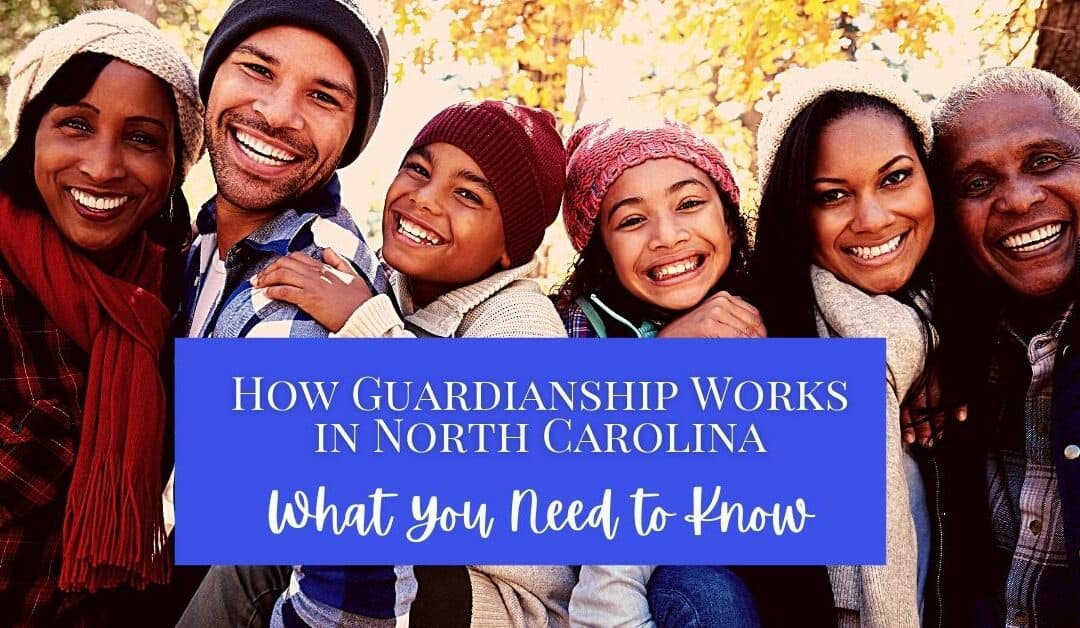If you have a loved one struggling to manage their life independently, you may wonder about how guardianship works in North Carolina. Let’s look at what guardianship is, the process of becoming a guardian, and the duties and responsibilities of a guardian. We will also answer frequently asked questions about guardianship in NC.
What is Guardianship in NC?
First, let’s look at what guardianship is in North Carolina. Our state defines adult guardianship as a relationship between a guardian appointed by the court to make decisions on behalf of someone who lacks sufficient capacity to manage their own affairs or make and communicate important decisions.
How Is a Guardian Appointed?
To understand guardianship, it helps to understand how you can file for guardianship over another person.
If someone you love struggles to manage their life independently, you may file a petition for incompetence. The court will set a hearing date and listen to testimony from experts, family members, the guardian ad litem, and witnesses or medical professionals.
Then, if the person receives a ruling as incompetent in one or more areas, the court will appoint a guardian.
Once the court appoints a guardian, the incompetent person is called the “Ward.” Incompetent is a legal term that means someone cannot care for or make decisions about their own daily needs.
Guardianship Arrangements in North Carolina
There are different types of guardianship with varying levels of freedom and independence. Courts in NC like to give as much freedom as possible to someone they adjudicate as incompetent.
Limited Guardianship:
For example, if you need to rest most days but are mentally sharp, the court may appoint a limited guardian. Your appointed guardian could use funds from your estate to hire help to make dinner for you each day. A limited guardianship is a good solution if you only need help in a few areas.
Guardian of the Person:
A guardian of the person cares for the personal needs of a ward. Their authority includes making decisions about where the Ward will live, healthcare, daily help with personal care needs, etc. Some examples of the duties the court gives you responsibility over include:
- Responsible for the care, comfort, and maintenance of the Ward’s person
- Charged with taking reasonable care of the Ward’s personal effects, i.e. clothes, furniture
- Arranges for the Ward’s training, education, employment, rehabilitation, or habilitation
- Establishes where the ward will reside (in the least restrictive environment)
- Gives consent or approval for medical, psychological, or other professional care, counsel, or treatment for the Ward in their best interest
- Allows the Ward to exercise rights that are within their comprehension
- Support the Ward’s right to participate in all decisions affecting them
- Petitions for restoration of competency if it becomes a viable option
- Cannot consent to sterilization unless by order of the clerk in cases of medical necessity (1)
Guardian of the Estate:
The court could appoint another limited arrangement where a guardian is only in charge of your financial affairs (your estate). If you get easily confused when handling complex matters but do fine just caring for yourself, the court may let you take care of your day-to-day issues such as dinner and home care while your guardian manages your finances.
- Manages the Ward’s property, estate, and business affairs
- Must post an insurance bond before receiving the Ward’s estate
- Takes control of the Ward’s estate (both real & personal property) for the Ward’s use
- Administers the estate prudently in the Ward’s best interest
- Pays the Ward’s debts, property insurance, income taxes, property taxes, and other taxes owed by the Ward from the Ward ‘s estate. (1)
- Many more specific duties listed at N.C.G.S. 35A-1251
General Guardian of the Person and Estate:
A general Guardianship manages the needs of the person and the estate. Full guardianship covers your daily care needs and the financial management of your estate.
Split Guardianship:
Sometimes the court will split a guardianship so that one person cares for your estate while another is in charge of managing your personal needs. The two guardians must work together to care for your needs and your estate’s management.
Other Limited Guardianships:
There are also other limited guardianship arrangements, like the above arrangements, except with less authority over the ward. The court limits what these guardians make decisions about:
- A Limited Guardian of the Person
- Limited Guardian of the Estate
- Limited General Guardian
FAQ: Guardianship in NC
Can my Ward get married? Divorced?
If the Ward understands marriage’s importance and requirements on the wedding day, the marriage is valid. The Ward doesn’t need to understand inheritance rights. If the Ward doesn’t understand marriage on the wedding day, the guardian may take legal action to cancel the marriage. Only the competent spouse can start a divorce.
If the Ward has children, they keep their parental rights unless the court terminates them in another civil proceeding. (1)
Does my Ward have the Right to Vote?
You can assist a Ward in the voting booth if they need help due to physical disability or other disabilities, including:
- Illiteracy
- Blindness
- Inability to enter the booth
- Unable to mark their ballot without help
However, assistance does not include choosing their vote for them. You can also take advantage of Curbside or Absentee Voting. (1)
Are there Limitations on the Ward’s Driving Privileges?
After adjudicating a person to be an incompetent adult, the Clerk of Court notifies the Department of Motor Vehicles, who sends a letter to the Ward suspending their driver’s license. (1)
We Can Help
If you need help with guardianship proceedings or administrative duties, contact us at Cape Fear Law. Our experienced guardianship attorneys work with you to plan for the future and help you understand all your options. Contact us today and find out how we can help you prepare for the future of a loved one.

